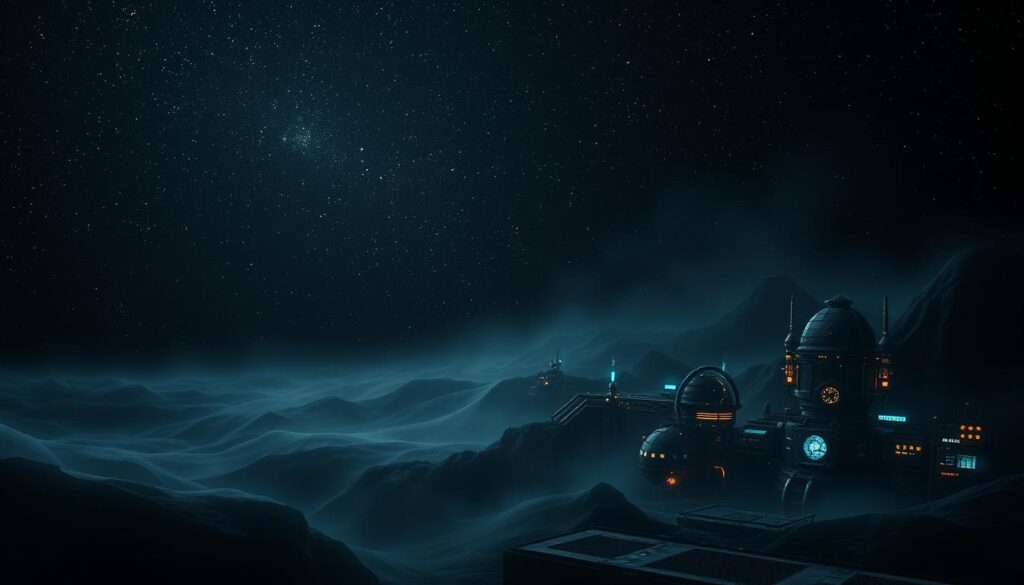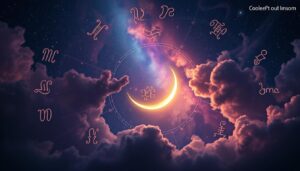In science fiction, music and soundscapes tell cosmic stories. They fill empty space with tales and connect us to worlds beyond Earth. Every note and noise in films and shows lets us feel the universe’s vastness and hidden memories.
Sci-fi sound design links human emotions with futuristic themes. Sounds like a spaceship’s hum or a distant planet’s echo create emotional bonds. These sounds connect viewers to the unknown.
Key Takeaways
- Music shapes how audiences experience sci-fi worlds.
- Soundscapes make imaginary places feel real.
- Cosmic memory is shown through recurring musical themes.
- Sci-fi sound design blends technology with storytelling.
- Emotions in space stories rely heavily on audio choices.
The Role of Sound in Science Fiction Narratives
Sci-fi stories use sound to make futuristic worlds feel real. Every sound, from beeps to explosions, brings alien worlds and space battles to life. Sound also shapes how we see characters and settings.
The Importance of Sound Design
Good sound design makes abstract ideas real. Here are some examples:
- Star Wars’ TIE fighter engines: high-pitched whines signal danger long before fighters enter frame.
- Alien hissing air vents: metallic groans hint at hidden threats in the Nostromo’s corridors.
- 2001: A Space Odyssey’s bone-crunching thuds during the ape scenes.
Audio as a Storytelling Tool
Sound engineers use sound shifts to guide stories. A table shows how sound choices impact plot:
| Film | Key Sound Element | Story Impact |
|---|---|---|
| Arrival | Foreign language voice recordings | Reinforces alien communication barriers |
| Blade Runner 2049 | Low-frequency drones | Emphasizes a decaying cyberpunk world |
| Gravity | Dead silence in space | Highlights astronaut isolation |
In Interstellar, Hans Zimmer’s ticking clocks show humanity’s urgency. This makes us feel the urgency as much as the characters do.
Iconic Sci-Fi Soundtracks That Define the Genre
Sci-fi soundtracks are more than background music. They are the heartbeats of their worlds. From the first symphonic note to electronic beats, these scores leave a lasting mark. They become part of our Cosmic Memory in Sci-Fi, lasting beyond the screen.
From Star Wars to Blade Runner
Two giants in sci-fi show the power of music:
- Star Wars (1977): John Williams’ Imperial March and Darth Vader’s Theme bring evil to life with brass and choir. The Main Title’s fanfares tell the galaxy’s story, etching it in our memory.
- Blade Runner (1982): Vangelis’ City Dripping and Sad Butler mix futuristic synths with sadness. The 2049 sequel by Hans Zimmer and Benjamin Wallfisch adds haunting vocals, linking sound to memory and identity.
The Influence of Electronic Music
Synths and electronic sounds changed sci-fi music:
- Daft Punk’s TRON: Legacy (2010) mixed French house beats with old-school futurism, turning code into sound.
- Stranger Things brings back 80s synthwave, mixing past and future. Tracks like Kavinsky’s Paris capture 80s sci-fi’s cosmic nostalgia.
These soundtracks do more than score scenes. They connect eras. Their rhythms and tones become part of Cosmic Memory in Sci-Fi. A single note can call up galaxies.
Exploring Cosmic Memory Through Sound
Sci-fi music is more than just background noise. It’s a journey through time. Through sound, stories connect past and future, making us feel the echoes of what’s been lost or imagined. These melodies act as time capsules, linking far-off worlds to our own.

Defining Cosmic Memory in Sci-Fi
Cosmic memory is the magic of sound carrying stories through time. When a sci-fi music theme returns, it brings back old feelings or hints at future adventures. A simple chord in Star Trek can remind us of entire journeys without words.
How Sound Evokes Nostalgia
- Looped motifs: In Guardians of the Galaxy’s Awesome Mix Tapes, repeated melodies connect characters to their human side.
- Retronautic sounds: Mad Max: Fury Road used 1980s synths to honor its past while looking to the future.
- Memory through silence: The quiet hums in S2001: A Space Odyssey hint at a universe older than us.
The Science of Sound in Outer Space
Cosmic memory in science fiction often imagines alien worlds buzzing with strange noises. But real space is a silent frontier. Let’s uncover the facts behind sound beyond Earth.
How Astronauts Perceive Sound
In space, sound can’t travel through empty vacuum. Astronauts rely on headsets inside their helmets to hear mission control. NASA recordings from Apollo missions prove this—voices crackle only via radio, not air vibrations. Even inside spacecraft, walls and equipment carry sound, but outside? Silence. Imagine drifting past Saturn’s rings—no wind, no echoes, just the hum of life support systems.
The Physics of Sound Waves in Space
Sound needs matter to move. Earth’s air lets voices carry, but space’s emptiness stops sound waves cold. Light and radio waves travel freely, but not the clank of a spaceship door or an alien’s footsteps. Films like Gravity sometimes mix cosmic memory in science fiction with realism—for example, showing explosions with visible shockwaves, even though sound can’t make them heard. Real physics shows space as a silent canvas, leaving only light and electromagnetic signals to bridge the void.
Music as a Character in Sci-Fi Films
In science fiction, soundtracks are more than just background music. They guide characters, show hidden feelings, and even hint at big plot changes. Think about how a song can follow a character’s story or a score can hint at big events.
Case Studies: Films Where Music Shapes Plot
- Blade Runner 2049: Vangelis’s haunting synth waves amplify the film’s search for identity, with the score’s echoing tones mirroring Ryan Gosling’s quest.
- Arrival: Johann Johannsson’s fragmented compositions mirror the protagonist’s fractured perception of time, turning the soundtrack into a narrative guide.
- Dune (2021): Hans Zimmer’s drum-heavy score becomes a character itself, its rhythms syncing with Paul Atreides’ visions and the desert’s pulse.
The Relationship Between Characters and Sound
Soundtracks in science fiction connect characters with viewers. In Interstellar, Hans Zimmer’s “Cornet” theme evolves with Cooper’s emotional journey, becoming a sonic representation of his love for his daughter. Director Christopher Nolan has noted,
“The music isn’t just background—it’s a language that speaks directly to the film’s heart.”
This shows how sci-fi soundtracks can capture themes like isolation, ambition, or survival.
Cultural Implications of Sci-Fi Soundscapes
Sci-fi’s space sounds in sci-fi are more than tech—they show global creativity. Films like Arrival use Middle Eastern scales and Dune features West African drums. This shows how music reflects our diverse world.
Diversity in Sci-Fi Music Choices
Today’s movies use music to connect cultures. For example, Star Wars mixes Celtic harps with Japanese taiko drums. This blending of traditions creates epic scores.
- Indian ragas in Interstellar’s score
- Maori chants in Avatar’s audio design
- Electronic beats mixed with Balinese gamelan in Netflix’s 3%
How Different Cultures Influence Sound Design

“Sound is a universal language—but its dialects are endless.” — Composer Hans Zimmer
Sound engineers now work with artists from around the world. Japanese composer Kenji Kawai used shakuhachi flutes in Patlabor to create a futuristic feel. Nigerian films like Space Oju blend juju guitar with synthwave, offering a unique Afrofuturist sound.
This mix is not just creative—it shows how audiences want stories that reflect their world.
The Evolution of Sci-Fi Music Technology
Technology has changed how sci-fi music explores the unknown. From early electronic sounds to AI-driven music, it’s a big leap. Now, creators can dive into interstellar music themes with great detail.
Early innovators used analog synths to create sci-fi sounds. These tools opened doors to future worlds:
The Role of Synthesizers and Electronic Instruments
- 1970s: Moog synthesizers introduced eerie sounds in Alien.
- 1980s: Roland’s Jupiter-8 enriched Tron’s digital scenes.
- Today: Digital tools like Logic Pro enable complex interstellar music.
Future Trends in Sci-Fi Sound Production
New tech is expanding sci-fi sound even more. Here’s what’s coming:
| Past Tech | Future Tech |
|---|---|
| Analog synths | AI-generated soundbanks |
| Manual mixing boards | VR audio design tools |
| Fixed instrument setups | Modular, AI-assisted systems |
Companies like iZotope and Sweetwater are introducing AI plugins. These predict chord progressions. Modular synths from Roland let you shape sounds live. As music themes get more complex, these tools will help artists bring cosmic ideas to life.
The Emotional Impact of Music in Sci-Fi
Sci-fi soundtracks are more than just background music. They are emotional engines. In movies like Interstellar or Arrival, music turns complex ideas into feelings. A haunting choir or a single piano note can make us laugh, cry, or hold our breath.
This shows that sound is sci-fi’s secret storyteller.
How Sound Shapes Audience Reactions
Music can instantly set our emotions. A minor chord builds suspense, while a soaring melody inspires hope. In Gravity, the score’s urgency matches the protagonist’s struggle, making us feel every heartbeat.
Directors use tempo, pitch, and instrumentation to control mood. They turn silence into tension and crescendo into triumph.
Case Studies: Emotional Moments Enhanced by Sound
Legendary scenes gain power through sound:
- Blade Runner 2049’s Cry Me A River remix uses distorted vocals to mirror the film’s melancholy.
- Guardians of the Galaxy uses retro songs to highlight humor and heart. It shows how even pop tunes can become celestial melodies in movies.
These examples prove that the right score can turn a scene into a memory. Celestial melodies in movies don’t just play—they transform. A well-crafted note can stay in our minds long after the credits roll.
This proves music’s power to make the impossible feel intimate.
Future of Music and Sound in Sci-Fi
Sci-fi storytelling is always pushing new limits, and so is its sound. New tech is changing how we hear music in movies. Soon, we might see more use of spatial audio and AI in soundtracks.
This could make movies feel even more real. Every sound will feel like it’s from another world yet still familiar.
Innovations in Audio for Sci-Fi Media
Formats like Dolby Atmos and DTS:X are changing how we hear music in movies. Imagine hearing real NASA space sounds mixed with made-up ones to sound like space travel. AI could even create endless sounds, just like the universe.
Predictions for Upcoming Sci-Fi Sound Trends
Future sci-fi sound might focus more on feelings. It could mix old-school orchestras with new synth sounds. This would show how humans and tech clash.
Virtual reality movies might put you right in the action. You could hear the hum of a spaceship or the wind of an alien planet. Sound will keep growing as a way to connect us to the unknown.



